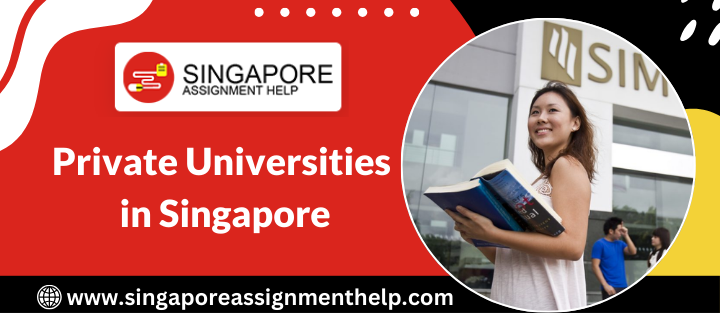Private Universities in Singapore

Singapore’s higher education landscape has undergone a remarkable transformation in recent decades, evolving from a system dominated by a handful of public institutions to a diverse ecosystem where private universities play an increasingly vital role. This shift reflects Singapore’s commitment to becoming a global education hub and its recognition of the need for varied educational pathways to support its knowledge-based economy. Private universities in Singapore have emerged as key players in this new landscape, complementing established public institutions and offering unique advantages to students and working professionals alike.
These institutions have not only expanded access to higher education but have also introduced innovative programs, flexible learning options, and strong industry connections that cater to the changing needs of both local and international students.
Buy high-quality essays & assignment writing as per particular university, high school or college by Singapore Writers
As Singapore continues to position itself as a leader in the global knowledge economy, private universities have become instrumental in nurturing talent, driving innovation, and meeting the diverse educational aspirations of a growing student population. This blog post delves into the world of private universities in Singapore, exploring their multifaceted roles, distinctive characteristics, and growing importance within the country’s renowned education system.
What Are Private Universities in Singapore?
Private universities in Singapore offer a wide range of academic programs, from business and engineering to arts and social sciences. They provide students with flexibility and numerous choices, often collaborating with prestigious international institutions. These partnerships enable students to gain global exposure without leaving Singapore. Private institutions can cater to different needs, whether you’re seeking specialized programs, flexible study options, or strong industry connections. They can be broadly categorized into two main types:
- Local Private Universities: These are Singapore-based institutions granted the right to award their degrees. Examples include:
- Singapore Institute of Management (SIM)
- Singapore University of Social Sciences (SUSS, formerly UniSIM)
- PSB Academy
- Kaplan Singapore
- Foreign University Branches and Partnerships: These are campuses or collaborative programs established by overseas universities in Singapore. Notable examples include:
- James Cook University Singapore
- INSEAD Asia Campus
- DigiPen Institute of Technology Singapore
- Murdoch University Singapore
- University of London Programs (through SIM)
Private universities often specialize in specific fields of study or cater to working professionals seeking to upgrade their skills. They typically offer a mix of undergraduate and postgraduate programs, as well as professional certifications.
The Singapore Education System: An Overview
To understand the role of private universities, it’s crucial to grasp the structure of Singapore’s education system:
- Primary Education (6 years)
- Secondary Education (4-5 years)
- Post-Secondary Education:
- Junior Colleges (2 years)
- Polytechnics (3 years)
- Institute of Technical Education (ITE) (1-2 years)
- Tertiary Education:
- Public Universities (3-4 years for undergraduate programs)
- Private Universities (varying durations)
Singapore’s education system is globally recognized for its rigorous standards and focus on academic excellence. The integration of private universities has expanded the options available to students and working professionals seeking higher education.
Hire a Professional Essay & Assignment Writer for completing your Academic Assessments
Native Singapore Writers Team
- 100% Plagiarism-Free Essay
- Highest Satisfaction Rate
- Free Revision
- On-Time Delivery
Importance of Private Universities in Singapore
Private universities play a crucial role in Singapore’s education landscape for several reasons:
- Increased Access to Higher Education: Private universities help meet the growing demand for tertiary education in Singapore, offering additional pathways for students who may not secure places in public universities.
- Flexibility for Working Professionals: Many private universities offer part-time and evening programs, allowing working adults to pursue further education while maintaining their careers.
- Industry-Relevant Curriculum: Private institutions often collaborate closely with industry partners to design programs that meet current market needs, ensuring graduates are job-ready.
- International Exposure: Foreign university partnerships bring global perspectives and international faculty to Singapore, enhancing the country’s position as an education hub.
- Specialization and Niche Programs: Private universities can quickly develop and offer specialized programs in emerging fields, complementing the broader offerings of public universities.
- Research and Innovation: Some private universities contribute to Singapore’s research ecosystem, particularly in applied fields and industry-specific innovations.
Regulatory Framework and Quality Assurance of Private Universities in Singapore
To maintain high standards across the higher education sector, Singapore has implemented robust regulatory measures for private universities:
- Committee for Private Education (CPE): This statutory board regulates the private education sector, ensuring institutions meet quality standards and protect student interests.
- EduTrust Certification: A quality assurance scheme that assesses private education institutions on key areas such as management, academic processes, and student protection.
- Registration of Courses: All courses offered by private universities must be registered with the CPE, ensuring they meet certain quality criteria.
Stuck with a lot of homework assignments and feeling stressed ? Take professional academic assistance & Get 100% Plagiarism free papers
Landscape of Private University in Singapore : A Diverse Ecosystem
Singapore Institute of Management (SIM)
SIM stands out for its sheer scale and impact. With over 180,000 graduates, it’s a cornerstone of Singapore’s private education sector. SIM’s Global Education arm partners with prestigious universities worldwide, offering a global perspective right in the heart of Singapore. Their student life is vibrant, with over 70 interest groups ranging from arts to entrepreneurship clubs.
Key Features:
- Over 10 overseas university partners, including University of London and RMIT
- More than 50 full-time and part-time academic programs
- State-of-the-art campus facilities, including a financial training centre
- Strong emphasis on holistic education with over 70 student clubs and interest groups
PSB Academy Dubbed “The Future Academy,” PSB Academy is laser-focused on emerging industries. Their STEM Campus is a testament to this commitment, featuring cutting-edge labs for biotechnology, engineering, and cyber-security. PSB’s unique “Future Proof” program integrates industry certifications into degree courses, ensuring graduates are job-ready from day one.
Key Features:
- Two modern campuses: PSB Academy City Campus and PSB Academy STEM Campus
- Collaborations with over 600 industry partners for internships and projects
- Flexible study options including full-time, part-time, and e-learning modes
- Strong focus on employability with a dedicated Career Services Office
East Asia Institute of Management (EASB)
EASB has carved out a niche in hospitality education. Their practical approach includes running a student-managed restaurant open to the public, providing real-world experience. They’ve also pioneered a unique “Earn and Learn” program in partnership with local hotels, allowing students to work and study simultaneously.
Key Features:
- Partnerships with universities from the UK, Australia, and the US
- Strong focus on hospitality and tourism management
- Internship opportunities with leading companies in Singapore
- Regular industry talks and workshops
Nanyang Institute of Management
Nanyang stands out for its focus on Chinese-English bilingual business education. This approach taps into Singapore’s unique position as a bridge between Eastern and Western business cultures. Their “Business Chinese” modules are particularly popular among international students looking to gain an edge in Asian markets.
Key Features:
- Small class sizes for personalized attention
- Practical curriculum with case studies and industry projects
- Regular career fairs and networking events
- Blended learning approach combining face-to-face and online instruction
Aventis School of Management
Aventis takes a different approach by focusing exclusively on graduate and executive education. Their “C-Suite Master Class Series” brings in top executives from major corporations to lead intensive workshops, offering students rare access to industry leaders.
Key Features:
- Focus on executive education and professional development
- Partnerships with international universities for dual degree programs
- Flexible weekend and evening classes for working professionals
- Strong alumni network in senior management positions
TMC Academy
TMC has made a name for itself in mass communications education. Their in-house production studio rivals those of major media companies, allowing students to create broadcast-quality content as part of their coursework. TMC also runs a community radio station, giving students hands-on experience in live broadcasting.
Key Features:
- Over 30 years of experience in private education
- Strong support for international students
- Regular industry visits and guest lectures
- Emphasis on English language proficiency
ERC Institute
ERC stands out for its entrepreneurship focus. Their on-campus “Startup Garage” provides physical space and mentorship for student ventures. ERC’s “Failure Lab” is a unique initiative where students analyze failed startups to learn valuable lessons, embracing failure as a learning tool.
Key Features:
- Entrepreneurship Resource Centre for Student Startups
- Partnerships with universities in the UK and Australia
- Regular entrepreneurship seminars and workshops
- Strong focus on developing business acumen and practical skills
SUSS (Singapore University of Social Sciences)
While SUSS became an autonomous university in 2017, it started as a private university (formerly UniSIM) and retains many characteristics of private institutions.
Key Features:
- Focus on lifelong learning and adult education
- Flexible, modular course structure
- Strong emphasis on social sciences and applied degree programs
- Extensive e-learning capabilities
Notable Programs:
- Bachelor of Early Childhood Education
- Bachelor of Science in Supply Chain Management
- Master of Gerontology
SUSS’s Niche: It excels in providing flexible education options for working adults, particularly in social science fields.
Curtin Singapore
While part of an Australian university, Curtin Singapore operates as a local entity. They’ve made waves with their “Double Degree” programs, allowing students to graduate with two full degrees in the time it usually takes to complete one. Their “Flagship Fridays” initiative brings industry leaders to campus weekly for intimate sharing sessions.
Stuck with a lot of homework assignments and feeling stressed ? Take professional academic assistance & Get 100% Plagiarism free papers
Challenges and Future Outlook for Private Universities in Singapore
While private universities have become an integral part of Singapore’s education landscape, they face some challenges:
- Perception of Quality: Some employers and students still perceive private university degrees as less prestigious than those from public institutions.
- Competition: The increasing number of private institutions has led to intense competition for students and resources.
- Balancing Profit and Education: As businesses, private universities must balance financial sustainability with educational quality and student welfare.
Looking ahead, private universities in Singapore are likely to:
- Focus more on lifelong learning and skills upgrading programs
- Increase collaboration with industry partners for more work-study programs
- Expand their online and blended learning offerings
- Develop more niche and specialized programs to differentiate themselves
Conclusion
Private universities have become an essential component of Singapore’s higher education ecosystem. By offering diverse programs, flexible learning options, and industry-relevant curricula, they complement public institutions and contribute to Singapore’s reputation as a global education hub. As the education landscape continues to evolve, private universities will play a crucial role in shaping the workforce of the future and supporting Singapore’s knowledge-based economy.
Get Assignment Help in All Private universities in Singapore
Singapore Assignment Help offers specialized assignment help services tailored for students across all private universities in Singapore. Whether you’re studying at Singapore Management University (SMU), Singapore University of Social Sciences (SUSS), or any other private institution, our team of experienced academic professionals is here to support you. We understand the unique curriculum and high standards expected in these universities, ensuring that your assignments meet the required criteria and academic excellence.
Our services cover a wide range of subjects and disciplines, from business and management to engineering and social sciences. We provide personalized assistance, including guidance on research, structuring your assignments, and proofreading and editing, to help you achieve top grades. With our expert help, you can confidently tackle your academic challenges and focus on excelling in your studies while balancing other commitments.











